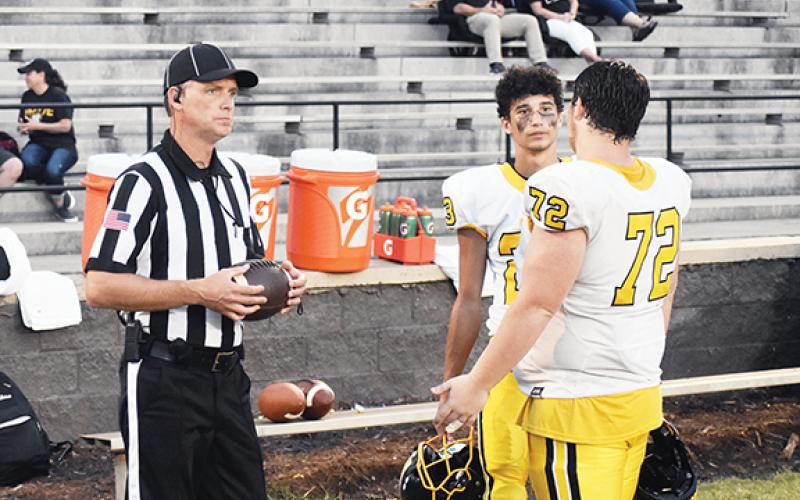The number of officials continues to decline in North Carolina, and it’s expected to remain a concern into the future.
Todd Mason – regional supervisor for Southwestern Officials Association, which helps coordinate games for officials in the area for every sport except high school football – said he had 50 certified officials pre-COVID.
The numbers dropped to 35 for the 2020-21 school year, then 30 last year. The drop occurred despite efforts by Mason and others to recruit more officials, whether in person or on social media.
“Whatever media outlet they use and say, hey reach out to friends and post and see if you can find anybody,” Mason said. “We haven’t got many.”
He expected a drop when COVID restrictions were in place for the 2020-21 season, but couldn’t point to a factor for why the decline continued this year. However, Mason added that fan behavior has gotten worse.
That’s something Daniel McNabb, who has officiated games locally since 1999, has noticed, too.
“I’ve recruited a lot of students and players to come out,” he said. “They’ll come out and call basketball, baseball and softball for a year – and then the fan abuse. They don’t want to be yelled at or screamed at.”
Despite being an official for more than 20 years, McNabb said he’s still one of the youngest in the game. Some of the older officials step aside due to health reasons, or in his case cut back on games because he wants to watch his three children play. The problem comes when those officials aren’t replaced.
Not enough training
Fewer officials also leads to problems with who is calling the games. In a perfect world, Mason said officials would work their way up, starting with recreation league games. Instead, some rookie officials call varsity games immediately. That means some officiating crews can have a weak link, with less-accurate calls in crucial situations.
“I don’t know if you ever get comfortable with any level,” McNabb said. “But it takes four or five years probably to be comfortable enough to be able to call a varsity game.”
Both McNabb and Mason said coaches and athletic directors are understanding about the issue. They still debate questionable calls in the heat of the moment, but have backed off in their criticism. Fans, however, are a different story.
“They understand there’s a shortage, and work with you and understand the shortage,” McNabb said of school coaches and administrators. “A lot of the fans, I don’t know if they don’t care or what the problem is, but that runs a lot of the younger people off.”
There are other issues that make the officiating shortage in western North Carolina unique compared to other parts of the state. For example, Mason’s territory is everything west of Balsam.
That means officials could have to drive more than an hour, depending on where they live and what game they’re assigned to. That’s much different than Buncombe County, which has seven different public high schools along with several private schools.
Costs cut into pay
With the association not reimbursing for mileage, that gas money can add up quickly, even with game fees.
In football, each member of the five-person crew makes $94.50, with increased fees for the playoffs. In basketball, each member of a three-person crew makes $69.50 for one game, $105 for two games. In baseball, an umpire makes $74.50, while the fee for softball is $71.50.
However, they also have to pay annual membership dues to the Southwestern Officials Association, which are $90 for football and basketball and $70 in baseball and softball – plus whatever it costs for needed equipment, like uniforms and whistles.
The pay was part of the reason Tommy Strickland stepped away, as well as the fan abuse. After taking over as the head baseball coach at Hiwassee Dam last year, he sees the effect the shortage has. The Eagles had several games last spring with only one umpire on the field.
“You can imagine how much is missed,” Strickland said. “It’s not their fault, you can’t be everywhere.”
As for incentives, both Mason and McNabb said they could look into paying veteran officials more money. But current officials are already stretched thin, even with some workarounds. For a sport like baseball and softball, Mason said he’ll book umpires for two games at different schools close by, trying to take advantage of schools that have lights and can play night games.
If the current trend continues, then workarounds like that might not happen. At some point, the numbers may not allow it.
That’s the reason why McNabb stays with it, even though he estimates he loses money every year.
“I don’t want my kids and everyone else’s kid to not be able to participate in sports like I did,” McNabb said, “because we don’t have
officials.”

